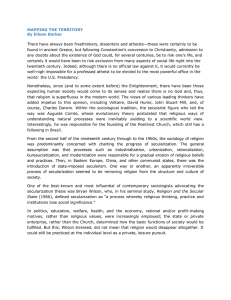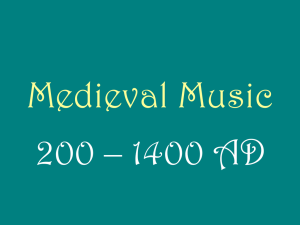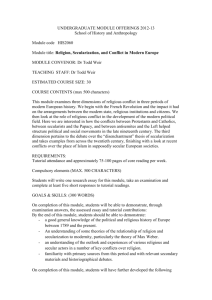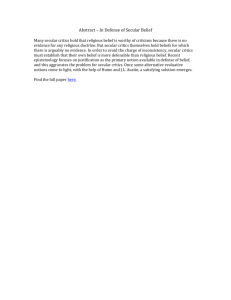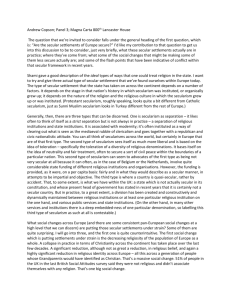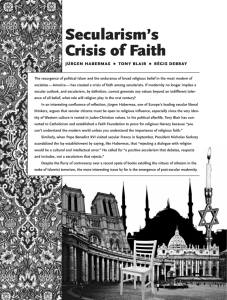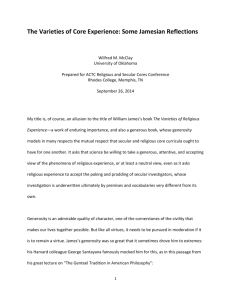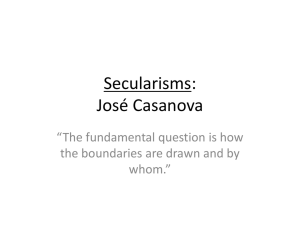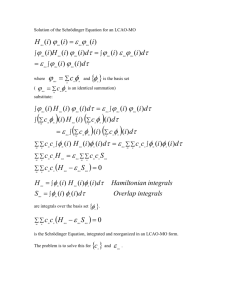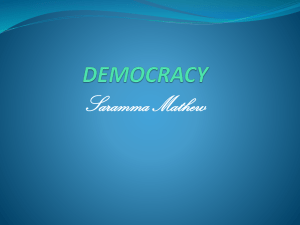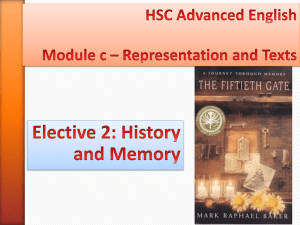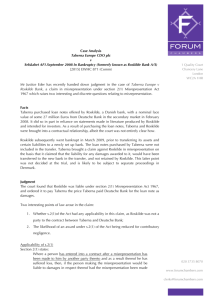The post-secular condition * challanges for social cohesion
advertisement
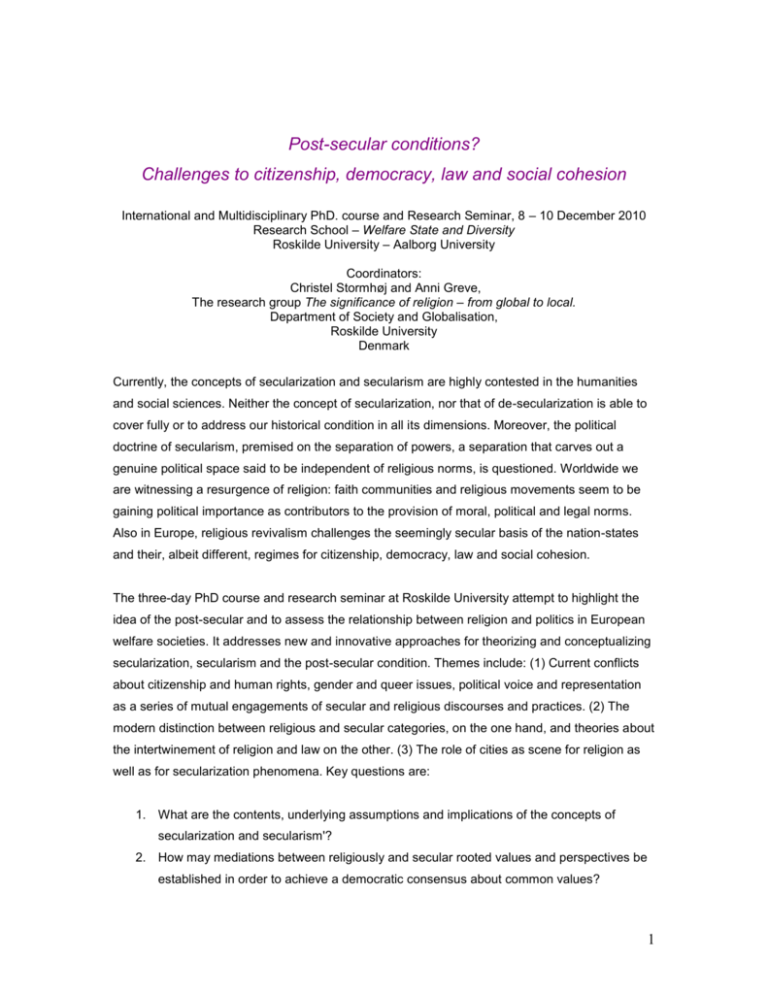
Post-secular conditions? Challenges to citizenship, democracy, law and social cohesion International and Multidisciplinary PhD. course and Research Seminar, 8 – 10 December 2010 Research School – Welfare State and Diversity Roskilde University – Aalborg University Coordinators: Christel Stormhøj and Anni Greve, The research group The significance of religion – from global to local. Department of Society and Globalisation, Roskilde University Denmark Currently, the concepts of secularization and secularism are highly contested in the humanities and social sciences. Neither the concept of secularization, nor that of de-secularization is able to cover fully or to address our historical condition in all its dimensions. Moreover, the political doctrine of secularism, premised on the separation of powers, a separation that carves out a genuine political space said to be independent of religious norms, is questioned. Worldwide we are witnessing a resurgence of religion: faith communities and religious movements seem to be gaining political importance as contributors to the provision of moral, political and legal norms. Also in Europe, religious revivalism challenges the seemingly secular basis of the nation-states and their, albeit different, regimes for citizenship, democracy, law and social cohesion. The three-day PhD course and research seminar at Roskilde University attempt to highlight the idea of the post-secular and to assess the relationship between religion and politics in European welfare societies. It addresses new and innovative approaches for theorizing and conceptualizing secularization, secularism and the post-secular condition. Themes include: (1) Current conflicts about citizenship and human rights, gender and queer issues, political voice and representation as a series of mutual engagements of secular and religious discourses and practices. (2) The modern distinction between religious and secular categories, on the one hand, and theories about the intertwinement of religion and law on the other. (3) The role of cities as scene for religion as well as for secularization phenomena. Key questions are: 1. What are the contents, underlying assumptions and implications of the concepts of secularization and secularism'? 2. How may mediations between religiously and secular rooted values and perspectives be established in order to achieve a democratic consensus about common values? 1 3. Do such mediations require translations of religious vocabularies into a universal language to achieve democratic legitimacy? 4. How may the concept of ‘rule of law’ be defined in a new globalized and multi-religious context? 5. How does religion interact with secularization phenomena of the modern great city? 6. What are the mechanisms behind culture trauma and citizens’ attachment to sanctuaries? Course format The three-day event will involve a series of speakers presenting papers and organized into three thematic sessions Invited speakers Veit Bader, Institute for Migration and Ethnic Studies (IMES) University of Amsterdam Kevät Nousiainen, Faculty of Law, University of Turku Anne Hellum, Department of Public and International Law, University of Oslo Paul Cloke, Department of Geography, University of Exeter Christel Stormhøj, Department of Society and Globalisation, Roskilde University Lisbet Christoffersen, Department of Society and Globalisation, Roskilde University Anni Greve, Department of Society and Globalisation, Roskilde University Birte Siim, Department of History, International and Social Studies, Aalborg University Anders Berg Sørensen, Department of Political Science, Copenhagen University Connie Carøe Christiansen, Department of Society and Globalisation, Roskilde University Thematic foci Religion, citizenship, and democracy Contemporary European societies are characterized by multi-religiosity and the co-existence of religious and secular groups and citizens. Secularism, which advocates a separation of politics and religion with reference to ideals of tolerance, impartiality, universality, liberty, and equality, has established a common and independent ground for public deliberation and contestation. Minority and majority religious groupings challenge the separation that constitutes an opposition between religion (private belief systems) and political citizenship (public domain) as they seek to influence the foundations of the polity. Increasingly, conflicts between religious and secular 2 worldview, values and practices arise, such as conflicts around religious symbols in public spaces, women’s and gay’s equality rights, the right to free speech and the universality of human rights. Key themes are: Secular-religious conflicts; possible translations between religious and secular vocabularies; the relationship between secularism and democracy; and, the development of new citizenship identities that cut across the religious/secular divide Religion and law relations Western law is based on the normative approach of being secular, that is: without any religious influence. This understanding of law also seems to influence a global concept of ‘the rule of law’. This theme considers how modern distinctions between religious and secular categories form the basis of models that regulate law & religion systems in the Nordic countries, in Europe and worldwide. Recognizing that state-building in post-secular times also have normative underpinnings opens for a post-secular recognition of possible intertwinements within these categories with the possible consequence of being able to explore a role of religion in public legal spheres. There is thus a need of rethinking relations between state and religion to understand the practical and principal changes within the content of different dimensions of the legal system, and to reflect on how the concept of ‘rule of law’ might be defined in a new globalized and multireligious context, concepts like ‘(soft) legal pluralism’ comes into the scope here. Religion and the city The modern city is the place in which the dynamics of religious attachment are revealed and expressed with greatest intensity and at the same time the locus for an international culture. How these two aspects interact is at focus. On the one hand the negative and threatening dimension of this interrelatedness: Religious fundamentalism as connected to a wider social construction of faith communities transmitted by trans-national religious networks; locally with the risk of ghettoization and disengagement, and globally with the risk of terrorism. On the other hand the positive and enabling dimension of this interrelatedness: Belief, faith and sacredness recognized as collective phenomena of utmost importance in running also modern societies; in particular to demonstrate the enduring importance of sanctuaries for coming to terms with modernity. Key themes are: Large cities as hotspots for split loyalties and demands; culture trauma and citizens attachment to sanctuaries; memory, desire and the sacred; and, the impact of new places of worship on the urban space Target group: 3 European PhD. students and other interested researchers within the field of sociology, law, culture studies, theology, gender studies, urban studies, and moral- and political philosophy Max 25 participants Time: 8 – 10 December 2010 Venue: Roskilde University, Universitetsvej 1, 4000 Roskilde, Denmark. ECTS: Participation in the course: 3 ETCS Presentation of paper: 2 ETCS (when the paper has been accepted) Post doc’s and senior reseachers may participate with or without presenting a paper. Fee: DKK 600, - (around Euro 80, -). The fee covers refreshments, lunch all days and a conference dinner. Participants must themselves pay for travel costs, accommodation etc. Deadlines: Registration and abstract: Not later than 10 November 2010 Paper: Not later than 29 November 2010. Registration; http://www.soc.aau.dk/forskerprogram/seminarer-og-kurser/registration/ Participants with paper must send abstract while registration to kbm@socsci.aau.dk Paper must be send to kbm@socsci.aau.dk Further information: Anni Greve, anni@ruc.dk or Christel Stormhøj: stormhoj@ruc.dk 4
